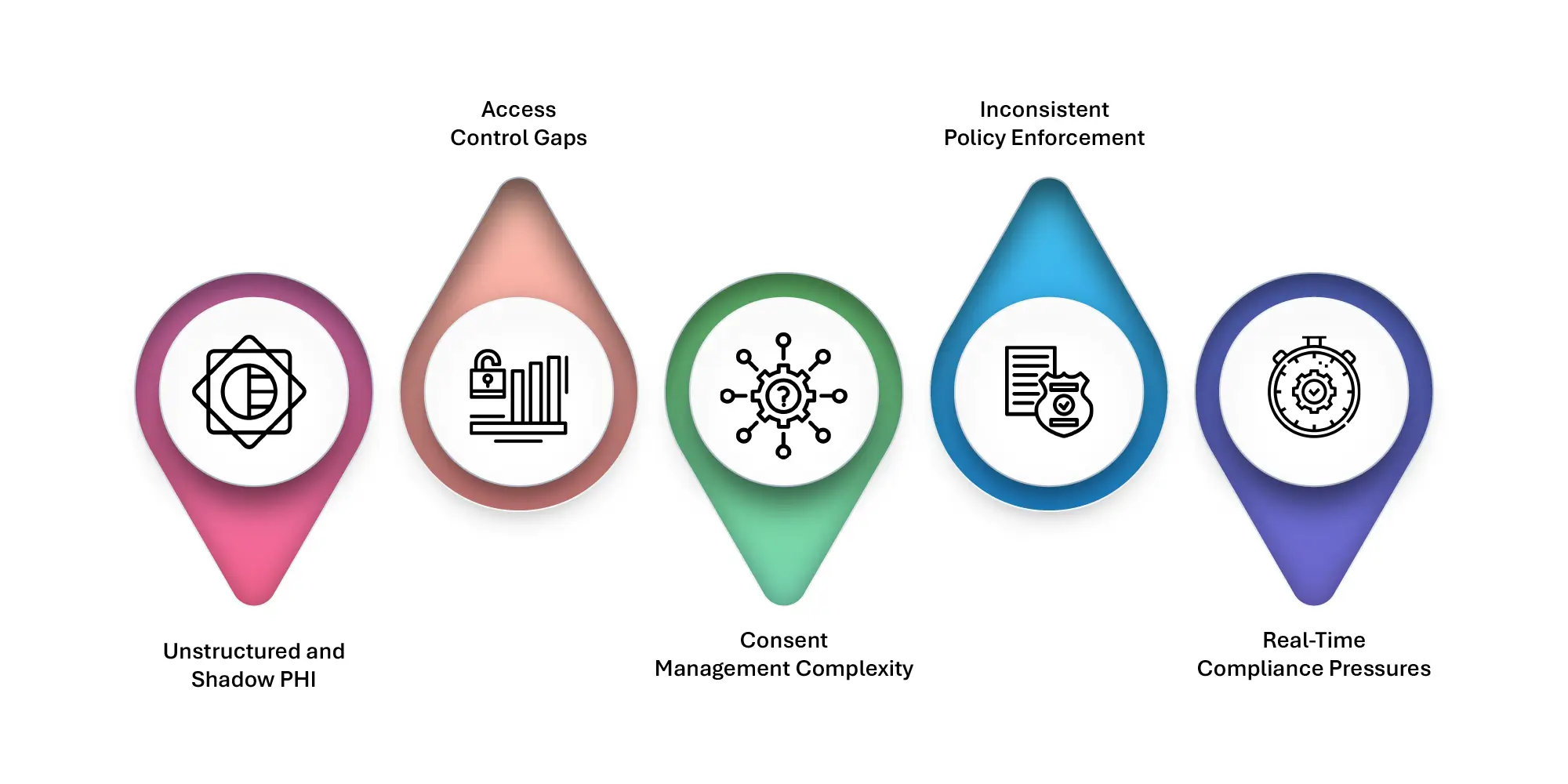What is PHI?
Protected Health Information (PHI) refers to any health-related data that can be linked to an individual and is governed by regulations such as the Health Insurance Portability and Accountability Act (HIPAA) in the United States. This includes obvious identifiers like names and Social Security numbers, as well as less direct data such as biometric records, lab results, insurance details, or device IDs, when associated with a medical context.
PHI exists across structured EHR systems and sprawling unstructured formats like emails, scanned forms, diagnostic images, and clinician notes. Its sensitivity makes it a prime target for cyber threats and regulatory scrutiny, especially as healthcare systems digitize and data flows across cloud, mobile, and AI platforms.
PHI in the Age of AI, Digital Health, and Sovereign Data Mandates
Protected Health Information (PHI) has evolved far beyond the walls of hospitals. In the modern digital health ecosystem, it flows across a vast network, touching insurers, remote care platforms, diagnostic wearables, AI training datasets, and cloud-based analytics engines. This mobility brings innovation, but also complexity. PHI is now the lifeblood of predictive medicine, powering everything from treatment personalization to fraud detection. However, as AI becomes central to care delivery, the bar for ethical and compliant use of PHI has never been higher.
Healthcare leaders must now answer hard questions: Can your AI explain why it flagged a high-risk patient or denied a claim? Was the PHI involved properly anonymized, consented to, and protected in every phase, from ingestion to output? These aren’t theoretical debates—they’re compliance triggers, reputational flashpoints, and legal liabilities in an era where AI governance is under the global microscope.
Layered onto this is the growing wave of data sovereignty legislation. Countries like India, Saudi Arabia, and members of the EU are asserting that health data must remain within national borders, forcing organizations to rethink how and where PHI is stored, processed, and accessed. In this reality, privacy, explainability, and jurisdictional control are no longer optional—they are core to digital health innovation and patient trust.
Challenges in Managing PHI – And Why It Matters

- Unstructured and Shadow PHI: Most PHI lives outside EHRs—in free-text notes, shared drives, and cloud archives. Without proper classification, this “dark PHI” creates major blind spots for compliance and security.
- Access Control Gaps: Role-based access is often coarse or outdated, leading to over-permissioned users or orphaned accounts, exposing PHI to internal misuse or external breach.
- Consent Management Complexity: Patients are demanding more control over how their data is used, especially in AI or research contexts. Static consent models no longer suffice in dynamic digital ecosystems.
- Inconsistent Policy Enforcement: In hybrid and multi-cloud setups, organizations struggle to apply consistent retention, masking, or encryption policies across platforms.
- Real-Time Compliance Pressures: With increased scrutiny from HIPAA, GDPR, and India’s DPDP Act, healthcare organizations must prove—not just assume—that PHI is handled ethically and lawfully.
Strategic Solutions for PHI Protection and Compliance

- AI-Powered PHI Discovery: Leverage AI/ML engines to automatically discover PHI across structured and unstructured formats, including clinical notes, scanned PDFs, and multimedia files.
- Granular Access Controls: Enforce Zero Trust principles by using attribute-based access, just-in-time provisioning, and behavioral analytics to limit unnecessary PHI exposure.
- Dynamic Consent and Data Minimization: Integrate real-time consent tracking and policy-aware access, ensuring PHI is only used for approved, purpose-specific workflows.
- End-to-End Encryption and Data Masking: Ensure PHI is protected in transit, at rest, and in use, with automated masking/redaction for non-authorized users or AI model inputs.
- Federated Compliance Dashboards: Enable centralized oversight of PHI access, movement, and usage while allowing local teams to operate within their jurisdictional and organizational boundaries.
Why PHI Governance is the Cornerstone of Digital Trust
In an age of data-driven medicine and AI-assisted diagnosis, PHI governance is the foundation of digital health ethics. It signals to patients, regulators, and partners that your organization treats health data with the sensitivity, security, and transparency it demands.
Beyond just avoiding fines or breaches, strong PHI governance builds trust, accelerates innovation, and ensures that as healthcare becomes smarter, it also becomes safer.
Because in healthcare, protecting data is protecting people.
Getting Started with Data Dynamics:
- Learn about Unstructured Data Management
- Schedule a demo with our team
- Read the latest Use Case: AI in Action: Building AI-Ready Data at Scale with Zubin






